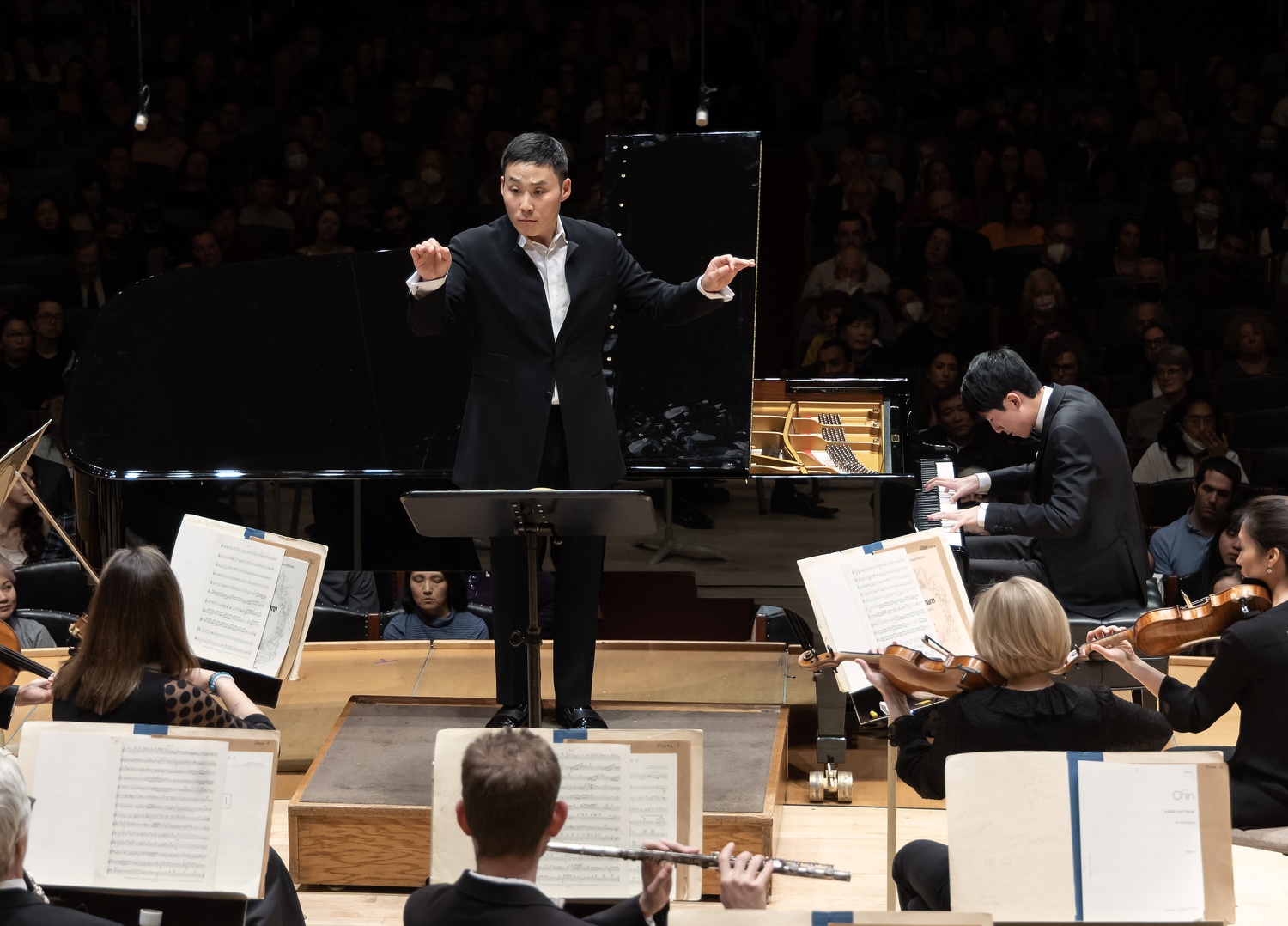
News
News Flash: Memory Shop and Anime Zakka to Open in Harvard Square

News
Harvard Researchers Develop AI-Driven Framework To Study Social Interactions, A Step Forward for Autism Research

News
Harvard Innovation Labs Announces 25 President’s Innovation Challenge Finalists

News
Graduate Student Council To Vote on Meeting Attendance Policy

News
Pop Hits and Politics: At Yardfest, Students Dance to Bedingfield and a Student Band Condemns Trump
Artist Profile: Conductor Earl Lee Debuts in Symphony Hall in Culmination of Rewarding Career

Earl Lee, a Korean-Canadian Assistant Conductor for the Boston Symphony Orchestra, reflected on his journey in music and the mentors who have shaped his path following his debut in Symphony Hall on April 6. Alongside pianist Eric Lu, Lee presented a stunning performance with selections from Unsuk Chin, Wolfgang Amadeus Mozart, and Robert Schumann.
When selecting the three pieces for the program, Lee had Beethoven in mind.
“We tried to have a connective element that binds everything together, and funny enough that it’s Beethoven.”
The first piece of the program was by Korean-born composer Unsuk Chin, “subito con forza.” The work was written in 2020 as a tribute to the 250th anniversary of Beethoven’s birth.
This was followed with Mozart’s iconic “Piano Concerto No. 20 in D Minor, K. 466,” a composition featuring a piano cadenza written by Beethoven that highlighted the impressive talent of soloist Eric Lu.
“People can hear how beautiful he plays, how he phrases. Where he takes time, where he breathes,” Lee said.
Lee lovingly reminisced on his growth as a conductor and accredited an early lesson from the late musician and conductor Bernard Haitink for his current ease and mastery in leading an orchestra as prominent and world-renowned as the BSO. As a student, Lee participated in a masterclass where his conducting skills were developed through leading an orchestra under Haitink’s guidance.
“What I always tell myself conducting is really what Maestro Haitink said — ‘Be clear and be there, but don’t disturb them’ — especially with a really amazing orchestra like BSO,” Lee shared.
One of Lee’s biggest takeaways was from witnessing the errors of another student conductor.
“He [the student conductor] was totally into it, moving a lot and passionate. And he [Haitink] just came and stopped him and said ‘Hey, try to not disturb them and stay out of their way, they’re really busy playing.’ And that really stuck with me for a long time,” he said.
Understanding the importance of trusting each individual musician within an orchestra rather than serving as an overbearing influence is one piece of advice that has stuck with Lee throughout his conducting career as he leads groups such as the San Francisco Symphony, Seoul Philharmonic, and Ann Arbor Symphony.
The final piece in Lee’s Symphony Hall debut was Schumann’s “Symphony No. 2” and the last movement quotes Beethoven’s “An die ferne Geliebte,” which drove the program’s unity home.
Lee also described the complexities of conducting a group of talented musicians.
“You sometimes ride along that or sometimes you try to steer the water into a different direction in a very subtle and clear way and it’s really fun,” he said.
Working with highly-skilled members of the BSO is undoubtedly an incredible opportunity for any conductor. Lee, however, is not typically limited to professional settings and also finds delight in mentoring young musicians.
“My goal was always treating the young musicians in the youth orchestra as my colleagues, not as their teacher,” Lee stated.
In the past, Lee shared that he has found rewarding experiences through his roles as the Artistic Director and Conductor for the Toronto Symphony Youth Orchestra and as Music Director for the Pittsburgh Youth Symphony Orchestra.
“Seeing them experience what I have experienced in that same seat when I was 13 years old. This spark of magic in their eyes — it’s really moving.”
Lee’s own beginnings as a young, budding cellist were in the Toronto Symphony Youth Orchestra, though he says that he did not anticipate his return.
“When I got asked to work as a conductor later in my life, which I never expected, it was so special.”
After reminiscing on his accomplished career, Lee emphasized the importance of music for those involved in music at any level.
“My goal is not to make everyone fall into music. I mean, to have them go into music [as a profession] that’s not the point,” Lee said. “Music is such a great way – especially playing together – is such a great way to just build friendship and to build our personality. I really think it’s food for our soul and peace.”
Want to keep up with breaking news? Subscribe to our email newsletter.
From Our Advertisers

Over 300+ courses at prestigious colleges and universities in the US and UK are at your disposal.

Where you should have gotten your protein since 1998.

Serve as a proctor for Harvard Summer School (HSS) students, either in the Secondary School Program (SSP), General Program (GP), or Pre-College Program.

With an increasingly competitive Law School admissions process, it's important to understand what makes an applicant stand out.

Welcome to your one-stop gifting destination for men and women—it's like your neighborhood holiday shop, but way cooler.

HUSL seeks to create and empower a community of students who are seeking pathways into the Sports Business Industry.
